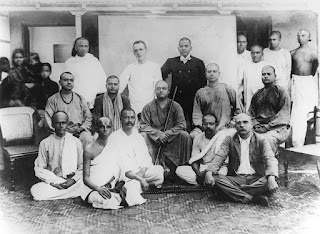राष्ट्रीय स्वयंसेवक संघ के ९० वर्षीय वयोवृद्ध प्रचारक श्री रंगा हरिजी का निधन २९ अक्टूबर को कोच्चि में हुआ। अन्तिम दिनों के दौरान उनकी दो पुस्तकें प्रकाशित हुईं, जिनमें एक था – 'पृथ्वी सूक्तम'। इसका विमोचन दिल्ली में सरसंघचालक डॉ. मोहन भागवत ने किया। कार्यक्रम की अध्यक्षता केरल के राज्यपाल आरिफ मोहम्मद खान ने की। उन्होंने इस पुस्तक के सम्बन्ध में अपने अनुभव बताए, जिसका ऊपर उल्लेख किया गया है।
श्री रंगा हरिजी की दूसरी पुस्तक 'महाभारत युधिष्ठिर की थानल' है। केरल के बालाश्रम में रंगा हरिजी की उपस्थिति में संघ के अखिल भारतीय सह सरकार्यवाह डॉ. मनमोहन वैद्य ने इसका विमोचन किया।
इस तरह की कई पुस्तकों के माध्यम से, श्री रंगा हरिजी ने लगभग ७० वर्षों तक संघ प्रचारक के रूप में अपने तपोमय जीवन के दौरान लाखों स्वयंसेवकों और हजारों प्रचारकों को प्रेरित किया और उनका मार्गदर्शन किया। अर्थशास्त्र में बी.ए. करने के बाद वे सन १९५१ में प्रचारक बन गए।
श्री रंगा हरिजी एक महान संगठनकर्ता थे। वे १० वर्षों तक केरल प्रान्त के प्रचारक रहे, इस दौरान उन्होंने यहाँ हिन्दू एकीकरण कार्य को और मजबूत किया गया। एक स्पष्ट निर्णयकर्ता, एक ऐसा व्यक्ति जिसने एक शोधकर्ता, इतिहासकार, लेखक और वक्ता के रूप में कई आयामों पर अपनी छाप छोड़ी। अपनी मातृभाषा मलयालम् के अतिरिक्त, वे मराठी, कोंकणी, तमिल, संस्कृत, असमिया और पंजाबी जैसी विभिन्न भाषाओं में पारंगत थे। उनके पास विभिन्न विषयों पर ज्ञान का भंडार था।
उन्होंने एशिया और ऑस्ट्रेलिया में हिन्दू स्वयंसेवक संघ का मार्गदर्शन किया और २२ देशों की व्यापक यात्राएं कीं; उन्होंने प्री-क्रिश्चियन रिलीजन एंड ट्रडिशन के वैश्विक सम्मेलनों में भाग लिया।
संघ कार्य में अपने योगदान के रूप में उन्होंने अनेक पुस्तकें लिखीं, जिनमें संघ के संस्थापक डॉ. हेडगेवार की जीवनी उल्लेखनीय है। श्री गुरुजी (एम.एस. गोलवलकर) के सम्पूर्ण कार्यों का स्मारकीय १२ खंडों का संकलन उनके वर्षों के शोध का फल था। उन्होंने ७० से अधिक पुस्तकें लिखीं। श्री रंगा हरिजी की कृतियाँ, - 'व्यास भरतथिले भीष्मर' (व्यास भारत में भीष्म), 'व्यास भारत में कृष्ण', 'व्यास भारत में कर्ण', 'व्यास भारत में द्रौपदी', और 'व्यास भारत में नारद' सामान्य जनता को समझने की दृष्टि से बहुत उपयोगी है।
उनका जीवन संघकार्य के माध्यम से समाज के प्रति पूर्णतः समर्पित था। उन्होंने सभी परिस्थितियों में अथक परिश्रम किया। मातृभूमि के लिए अपने जीवन का प्रतिपल समर्पित करने के उनके संकल्प को कोई भी डिगा नहीं सका। ऐसा लग रहा था कि ईश्वर की यही इच्छा थी। रंगा हरिजी की स्मरणशक्ति उनके जीवन के अन्तिम क्षण तक एकदम सही थी। किन्तु जब वे संघ के अखिल भारतीय बौद्धिक प्रमुख थे तो एक सड़क दुर्घटना ने उनकी स्मृति पूरी तरह छीन ली। तत्कालीन सरसंघचालक श्री सुदर्शनजी ने निर्देश दिया कि मलयालम् जाननेवाली एक नर्स उनकी देखभाल करेगी क्योंकि उनकी स्मृति से मातृभाषा का भी लोप हो चुका था। सबसे बढ़कर, उनके उपासना देवता श्री नरसिम्हा मूर्ति का मंत्र भी भूल गए थे। मानो हृदय निचोड़ लिया गया हो, एक शब्द भी न बोल पाने के कारण आँखों से आँसू बहते रहे। वह संघ कार्य को जारी रखने के लिए किसी भी कीमत पर अपनी स्मृति वापस चाहते थे, जिससे वे वास्तव में भगवान का कार्य मानते थे। यदि कोई भगवान की शरण लेता है, तो भगवान अवश्य उत्तर देते हैं, ऐसा श्री रामकृष्ण परमहंस ने कहा था। अपने हृदय की गहराई से उन्होंने ईश्वर से प्रार्थना की। भावपूर्ण प्रार्थना का उत्तर मिला। धीरे-धीरे उनके दिमाग में नरसिम्हा मूर्ति मंत्र वापस आ गया। फिर एक-एक करके सब कुछ पहले की तरह स्पष्ट हो गया। इस बात का खुलासा उन्होंने स्वयं ही किया है। समाज के प्रति उनका समर्पण देखकर नर्स इतनी आश्चर्यचकित हुई कि उन्होंने कहा कि इससे उनके जीवन में भी बदलाव आया।
उन्होंने अपने जीवन के अन्तिम दिनों में बिस्तर पर पड़े रहने के दौरान उनसे मिले संघ कार्यकर्ताओं से कई बातें साझा कीं। उनमें से एक था, - उनका अब और लिखना बंद करने का निर्णय। उन्होंने कहा कि उन्होंने जो पहली पुस्तक लिखी, वह स्वामी विवेकानन्द के प्रवचनों से एकनाथजी रानडे द्वारा संकलित 'राऊजिंग कॉल टू द हिन्दू नेशन' का मलयालम अनुवाद था। उन्होंने आखिरी पुस्तक श्री रामकृष्ण परमहंस पर लिखी थी! उन्होंने बताया कि श्री गुरुजी गोलवलकर की जो जीवनी उन्होंने लिखी थी उसमें कई सूक्ष्म बातें हैं।
एक अन्तिम पत्र में, श्री रंगा हरिजी की इच्छा थी कि उनका अन्तिम संस्कार सार्वजनिक श्मशान में किया जाए और उन्होंने कहा था कि उनके लिए कोई अन्तिम प्रणाम नहीं होना चाहिए, साथ ही उन्होंने यह भी कहा था कि संगठन में की जानेवाली प्रार्थना शवस्थान (श्मशान) में नहीं की जानी चाहिए।
श्री रंगा हरि का जीवन उन सभी लोगों के लिए प्रेरक है जो भारतमाता के लिए कार्य करने की इच्छा रखते हैं। - श्री पद्म कुमार, दक्षिण क्षेत्र सेवा प्रमुख
"रंगा हरि ज्ञान का सागर है। ज्ञान, विचार और बुद्धि के उस स्पष्ट प्रकाश को मेरा प्रणाम।" - स्वामी चिदानंदपुरी, अद्वैत आश्रम
Celebrating 50 Glorious Years of the Vivekananda Rock Memorial : विवेकानन्द शिला स्मारक - एक भारत विजयी भारत : www.vrmvk.in
---
You received this message because you are subscribed to the Google Groups "Daily Katha" group.
To unsubscribe from this group and stop receiving emails from it, send an email to daily-katha+unsubscribe@googlegroups.com.
To view this discussion on the web, visit https://groups.google.com/d/msgid/daily-katha/CAJguLpXBpaUJW%2BaGipxSLM19xQeHPJhHZsAMf7UX1b9D9Fyr4A%40mail.gmail.com.










